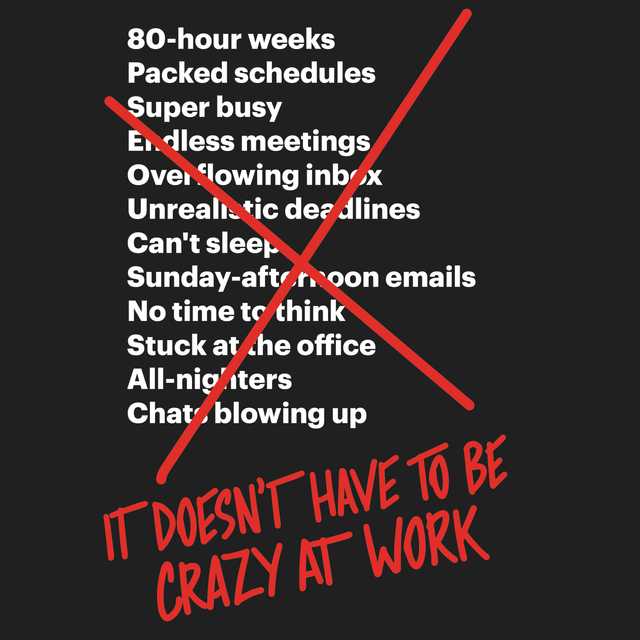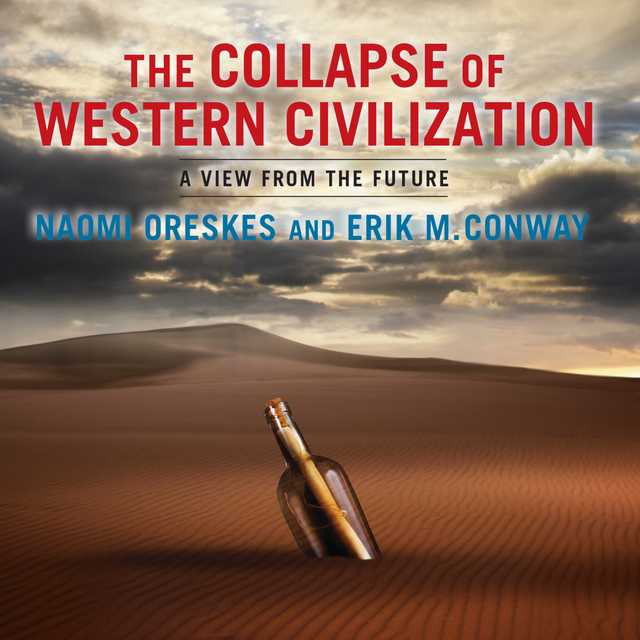It Doesn’t Have to Be Crazy at Work Audiobook Summary
In this timely manifesto, the authors of the New York Times bestseller Rework broadly reject the prevailing notion that long hours, aggressive hustle, and “whatever it takes” are required to run a successful business today.
In Rework, Jason Fried and David Heinemeier Hansson introduced a new path to working effectively. Now, they build on their message with a bold, iconoclastic strategy for creating the ideal company culture–what they call “the calm company.” Their approach directly attack the chaos, anxiety, and stress that plagues millions of workplaces and hampers billions of workers every day.
Long hours, an excessive workload, and a lack of sleep have become a badge of honor for modern professionals. But it should be a mark of stupidity, the authors argue. Sadly, this isn’t just a problem for large organizations–individuals, contractors, and solopreneurs are burning themselves out the same way. The answer to better productivity isn’t more hours–it’s less waste and fewer things that induce distraction and persistent stress.
It’s time to stop celebrating Crazy, and start celebrating Calm, Fried and Hansson assert.
Fried and Hansson have the proof to back up their argument. “Calm” has been the cornerstone of their company’s culture since Basecamp began twenty years ago. Destined to become the management guide for the next generation, It Doesn’t Have to Be Crazy at Work is a practical and inspiring distillation of their insights and experiences. It isn’t a book telling you what to do. It’s a book showing you what they’ve done–and how any manager or executive no matter the industry or size of the company, can do it too.
Other Top Audiobooks
It Doesn’t Have to Be Crazy at Work Audiobook Narrator
Eileen Stevens is the narrator of It Doesn’t Have to Be Crazy at Work audiobook that was written by Jason Fried
JASON FRIED is the cofounder and CEO of Basecamp. He started the company back in 1999 and has been running the show ever since. Along with David, he wrote Getting Real, REWORK, and REMOTE. When it comes to business, he thinks things are simple until you make them complicated. And when it comes to life, we’re all just trying to figure it out as we go.
About the Author(s) of It Doesn’t Have to Be Crazy at Work
Jason Fried is the author of It Doesn’t Have to Be Crazy at Work
More From the Same
- Publisher : HarperAudio
- Abraham
- American Gods [TV Tie-In]
- Dead Ringer
- House of Sand and Fog
- Prey
It Doesn’t Have to Be Crazy at Work Full Details
| Narrator | Eileen Stevens |
| Length | 3 hours 18 minutes |
| Author | Jason Fried |
| Category | |
| Publisher | HarperAudio |
| Release date | October 02, 2018 |
| ISBN | 9780062877086 |
Subjects
The publisher of the It Doesn’t Have to Be Crazy at Work is HarperAudio. includes the following subjects: The BISAC Subject Code is Business & Economics, Management
Additional info
The publisher of the It Doesn’t Have to Be Crazy at Work is HarperAudio. The imprint is HarperAudio. It is supplied by HarperAudio. The ISBN-13 is 9780062877086.
Global Availability
This book is only available in the United States.
Goodreads Reviews
Bill
October 12, 2018
Fried and DHH are once again offering a clarion call from The Future; ignore it at your peril. This is essential reading if you've ever thought that the millenial badge of honor, being busy beyond belief, may actually be a foolish road to ruin. If you're wise enough to know that your best work is not output at hour 12, 10, or even 8. If you're fed up that the potential of your brilliant teammates is being squandered.It's easy to critique norms and far harder to illuminate other paths, and the emphasis of this book is on the latter. As always, I appreciated their succinct, clear writing style. I really appreciated that they admit how many failed ideas they tried before finding what worked for them. Unlike a lot of get-rich-quick companies who stumble into a madly profitable sector and then conclude that it was their unique secret sauce that got them there (Amazon, Google, etc), Basecamp clearly lives and breathes a spirit of kaizen.And although I can already hear the skeptics saying, "That's great for them but it won't work here...", I suggest you read this and apply just one of its practices to yourself or your team. I think you'll be happier.
Willian
April 27, 2021
I'm migrating all my reviews to my blog. If you want to read the full review with my raw notes, check it here: https://pothix.com/crazyatworkWhat a great book! The best part of this book is that there's nothing so out of this world there, they are just talking about what we should be doing.Hey, it's true, it doesn't have to be crazy at work. We can still do our best and deliver an amazing product without making ourselves miserable working like crazy to meet some made-up numbers used as "goals". We can still be ambitious and make something our users love without driving the whole team crazy. We can have a productive environment to let people do their work in the best way possible.Having a calm and productive environment is a choice.There are many great tips in this book and I already saw a situation where the solution proposed would apply.
Philipp
November 30, 2018
Alternative title: 'Come work at Basecamp!'There's something weird about modern work culture, things our grandfathers have fought and died for, like the 40 hour work-week, are being unrolled, not directly by your mean bosses, but by neoliberalism/late stage capitalism's magic trick that implanted a tiny voice within yourself, telling you that if you don't give 200%, you'll be left behind. (For more discussion on this weird development, see Byung-Chul Han's Psychopolitik, or Fromm's Sane Society).One famous example is Elon Musk, who seems to flip-flop between being publicly.... weird, and telling people that you need to work more than 80 hours per week, like him. I guess there's a strong link between both. A lot of the modern Internet startup culture is like this - work yourself to the bone in hope of eventual riches (spoiler: someone else is getting rich). As a scientist there's a similar streak in our work culture, except that nobody is getting rich - and I've seen similar things in the medical profession.Jason Fried and David Hanemeier Hansson (DHH) both co-founded Basecamp (formerly 37signals?), an Internet company that posits itself as a 'calm company', a place where everybody works 40 hours at the most, a company which doesn't try to grow at all costs. That's what this manifesto is about, essentially a 'modern work culture is BS', followed by 'this is how we are doing this' points, all in short chapters.Some stuff you want to print out and glue to people's heads:Time-management hacks, life hacks, sleep hacks, work hacks. These all reflect an obsession with trying to squeeze more time out of the day, but rearranging your daily patterns to find more time for work isn’t the problem. Too much shit to do is the problem. The only way to get more done is to have less to do. Saying no is the only way to claw back time. Don’t shuffle 12 things so that you can do them in a different order, don’t set timers to move on from this or that. Eliminate 7 of the 12 things, and you’ll have time left for the 5. It’s not time management, it’s obligation elimination. Everything else is snake oil.a lot of the other stuff feels more like advertising for working at Basecamp. Yes, I know this worked for you very well and it took a lot of pressure from your employees, but it's one of many possible solutions. Without numbers or research I cannot tell whether this particular solution is 'better' (for example, yes, 40 hours makes for happier employees, and working longer than that is likely to be detrimental to the work itself - but how much detrimental is it, is it even detrimental, and what about 50, 60, 70 hours, where does it get worse? I don't think there are numbers out there for this?)But anyway, I'm hoping that this and similar books will cause a re-thinking as to how people treat their work, and their workplace, and their employees. This is one of those books that you should buy a few copies of, then leave them around for someone to serendipitously find. Not just in the business world, but also in scientific research.
Nada
September 15, 2020
I wish I can act on this effective immediately. Maybe I should give it to my boss ://
Andreea
January 31, 2022
Mi-a plăcut tare mult, deși pe alocuri mi s-a părut a fi o carte despre cât de cool de Basecamp ca mediu de lucru și business. Da, sunt lucruri de bun-simț, nimic care să se fi simțit ca o revelație, însă aveam atât de mare nevoie de carte asta și a venit la fix.
Alex
December 22, 2018
Excellent book on how to build sane business.
Emma
March 01, 2020
This is the second time I've read this book (the first time I listened to the audio book) and admittedly, while I love 85% of the sentiments throughout the book, I found a few things problematic.Before we get to the problematic areas, I wanted to note a few things I did enjoy.Basecamp's outlook on company benefits and how they should aim to get the employees *out* of the office and not keep them in (like free lunches and dinners do) is spot on. And paying for employees' vacations yearly almost forces them to relax, which in this day and age we need.I also enjoyed how they employ a no-negotiation policy and how they pay their employees the top 10% market value of the employees' roles based out of San Francisco, even though their employees can live wherever they so choose. I enjoyed the "absorb before responding" workflow. It allows presentation recipients to truly think through a proposal instead of making a snap judgement.That being said, I also had some issues with the book.First, the authors, who founded Basecamp, talk a LOT about the benefits their policies have for employees. They preach it time and time again, yet we fail to actually hear about these benefits from the employees themselves. I would have liked to see some quotes from current and past employees testifying to these benefits instead of hearing about them second hand.Next, the authors seemed to contradict themselves, likely due to a lack of providing details. Each chapter is extremely short, which makes it easy to digest, but it sacrificed clarity that I personally missed.For example, they harp on the idea of "meeting free work time" and meetings as a last resort, but then later in the book describe how their chat services should be minimally used and you should never make decisions or have long chat threads. How can you possibly maintain solid collaboration, across time zones and with remote employees, if you're encouraged to NOT have meetings and NOT use chats? It seemed a bit contradictory due to a lack of explanation.This wasn't the only contradictory information I found either. Early in the book they talk about how employees don't have to let the team know where they are or if they're working. They're responsible for getting their work done but don't have to be transparent about when or where that is. However, later in the book they discuss their flexible PTO and flexible workdays and say that if an employee needs to leave early to pick up a child from school they can simply let their team know. So which is it?There was no mention of mentorship, which I would like to have seen.And lastly they discussed how consensus is NEVER feasible and you shouldn't aim for consensual decision making. But this is a very American-based mindset. In other parts of the world, they make decisions solely through consensus. America is a very top-down decision-making culture, but not every culture sees it this way. So it would be great if they could have recognized this.I feel like each chapter reads wonderfully as a standalone, however when put together into a larger narrative, a lack of oversight was apparent. I still enjoyed the book and believe every company can gain something from it, but there were a few things I took issue with that knocked it down a star for me.
Richard
December 01, 2018
Nice. It’s good to read business advice from successful business people that is so calm and takes a different line from almost any other I’ve read. Assuming working for Basecamp really is as good as the picture the authors paint then anyone working there is pretty lucky.A few stylistic quibbles aside this is a great enjoyable read. The only bit which jars for Europeans is flagging 3 weeks paid leave as something special - everyone I know gets at least 5 (excluding public holidays which are on top). But this is one detail in a book full showing a really pleasant attitude to work and business.If you happen to work for an awful employer I’m not sure if this book will irritate or inspire though!
Romans
November 09, 2018
Bam! Bam! Bam! This book shoots advice from the third gen of the way of working in software development. Will everything from this book be there in the future? No. Will everything here work for you? No. Are some things only possible if you are already highly profitable and don't have external capital? Yes.And then still there is a TON of valid points, suggestions and directions everyone should at least consider, and implement some. Or your competitors will.
Andra
December 27, 2018
Basecamp founders Jason Fried and DHH have the uncanny ability to provide a clearheaded account of their process, decisions and the outcomes that result from them in a way that inspires, drives and motivates others.Their concise writing style is a reflection of the way they intertwine utility with perspective-altering insights that challenge the status quo and cut through the BS to focus on what really matters.This is a book meant to be read and re-read regularly, a book that challenges conventional wisdom, a book that proves that you can build a business differently, according to your own rules, shaping its culture in a way that's rewarding and fair to everyone involved.I highly recommend it to anyone who's tired of business as usual and its fluff, BS and stress. There are ways to do things differently and this book gave me even more courage to do it.
Ivana
December 17, 2018
The praise of calm, commited, well-formulated, thought-through work environment. An antithesis to war metaphors in business literature and the talk about the need to grow endlessly (like The Hard Thing About Hard Things: Building a Business When There Are No Easy Answers) or the urgent need to be "happy" or "family".EDIT: There actually is one topic I actually miss in this book - the perspective of the remotely working employee of Basecamp. Just to have a glimps whether and how are those down-to-earth principles turned into practice by a "regular" team member.
Ali
March 30, 2020
I really like how committed the authors are to their ethical code. It's really awesome to see.That being said, this feels really hype-based. I'd love to see more from their employees, especially ones who have left the company.I also don't agree with all their standpoints, in fact their low-level of communication would leave me feeling isolated and unhappy most likely as an extrovert.I love how they feature their values and care so much about their employees, but I wish the book went deeper into who their company doesn't work for, because I imagine that's a lot of people.
Alina
January 04, 2020
Multe idei de luat si multe altele de combatut. Cate un exemplu pentru fiecare:De luat: principiul ‘lucrul in open space ca in biblioteca’.De combatut: lipsa oricaror obiective pe o perioada mai lunga de 6 saptamani; gandirea project-based.Una peste alta, o carte faina, care incearca sa ucida niste mituri corporatiste. Buna daca o adaptezi la situatia concreta in care te afli.
Jitariu
October 25, 2018
It's a great book not as a book per se, but as a proof that things can be different then we are made to believe. It's like a fairy tale that takes you in a different time and place. It shows you some things can work in the real world if you think about others as people, not as a way to achieve billions.
Alyssa
January 05, 2021
Great insight into surviving (and thriving) in the 9-5 work life. A bit repetitive at times.
Most Popular Audiobooks
Frequently asked questions
Listening to audiobooks not only easy, it is also very convenient. You can listen to audiobooks on almost every device. From your laptop to your smart phone or even a smart speaker like Apple HomePod or even Alexa. Here’s how you can get started listening to audiobooks.
- 1. Download your favorite audiobook app such as Speechify.
- 2. Sign up for an account.
- 3. Browse the library for the best audiobooks and select the first one for free
- 4. Download the audiobook file to your device
- 5. Open the Speechify audiobook app and select the audiobook you want to listen to.
- 6. Adjust the playback speed and other settings to your preference.
- 7. Press play and enjoy!
While you can listen to the bestsellers on almost any device, and preferences may vary, generally smart phones are offer the most convenience factor. You could be working out, grocery shopping, or even watching your dog in the dog park on a Saturday morning.
However, most audiobook apps work across multiple devices so you can pick up that riveting new Stephen King book you started at the dog park, back on your laptop when you get back home.
Speechify is one of the best apps for audiobooks. The pricing structure is the most competitive in the market and the app is easy to use. It features the best sellers and award winning authors. Listen to your favorite books or discover new ones and listen to real voice actors read to you. Getting started is easy, the first book is free.
Research showcasing the brain health benefits of reading on a regular basis is wide-ranging and undeniable. However, research comparing the benefits of reading vs listening is much more sparse. According to professor of psychology and author Dr. Kristen Willeumier, though, there is good reason to believe that the reading experience provided by audiobooks offers many of the same brain benefits as reading a physical book.
Audiobooks are recordings of books that are read aloud by a professional voice actor. The recordings are typically available for purchase and download in digital formats such as MP3, WMA, or AAC. They can also be streamed from online services like Speechify, Audible, AppleBooks, or Spotify.
You simply download the app onto your smart phone, create your account, and in Speechify, you can choose your first book, from our vast library of best-sellers and classics, to read for free.
Audiobooks, like real books can add up over time. Here’s where you can listen to audiobooks for free. Speechify let’s you read your first best seller for free. Apart from that, we have a vast selection of free audiobooks that you can enjoy. Get the same rich experience no matter if the book was free or not.
It depends. Yes, there are free audiobooks and paid audiobooks. Speechify offers a blend of both!
It varies. The easiest way depends on a few things. The app and service you use, which device, and platform. Speechify is the easiest way to listen to audiobooks. Downloading the app is quick. It is not a large app and does not eat up space on your iPhone or Android device.
Listening to audiobooks on your smart phone, with Speechify, is the easiest way to listen to audiobooks.






























